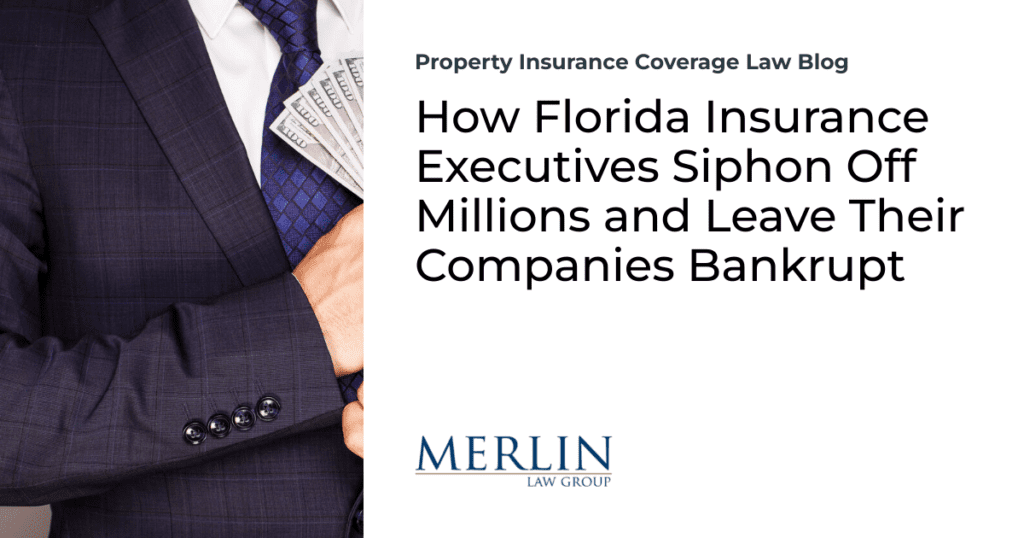How Florida Insurance Executives Siphon Off Millions and Leave Their Companies Bankrupt

Insurance companies are heavily regulated to guard against financial ruin, leaving policyholders without the promised financial safety net. Historically, many insurance companies would charge unsound actuarial rates, take premiums or surplus from the treasury and give it to insurer executives, and make illusory insurance contracts that paid little following a loss. This is why the industry is regulated on a state-by-state basis.
An article written by journalist Lawrence Mowry: Florida insurance company execs saw big payouts in years without hurricanes, helps shed light on why Florida’s insurance companies have become a private piggy bank for their investors and executives while failing to build up surplus and claims payment ability during non-hurricane years. The article noted:
In 2015, State Farm’s CEO earned $13.3 million overseeing America’s largest property insurance company.
That same year at Tampa-based Heritage Insurance Holdings, one of numerous small Florida-based homeowners insurance companies, its CEO made $27.3 million — despite overseeing 0.3% of the number of policies and accounts of State Farm.
Florida-based insurance companies have been going out of business the last few years or raising rates by double-digits. Industry groups and Gov. Ron DeSantis have blamed excessive litigation, and Republican legislators are poised this week to limit the incentives to sue insurers.
But state lawmakers have largely ignored an issue that has been directly blamed for numerous past company failures — and allowed some executives to make eye-popping sums of money over the last decade, when companies were wildly profitable thanks to years without a storm.
Between 2014 and 2018, the CEO for Fort Lauderdale-based Universal Insurance Holdings made between $14 million and $25 million each year, corporate filings show. The company has reduced its policies in Florida over the last year.
At St. Petersburg-based United Insurance Holdings, whose insurance arm fell under state supervision last week, the company awarded millions of dollars in stock dividends, most of which went to company officers and directors, even while its profits shrank, according to corporate filings.
…While insurance companies in Florida are closely regulated, with caps on payouts and profits, their parent and sister companies are largely unregulated.
…
State regulators have long been aware of the dangers of out-sized arrangements between insurers and their sister and parent companies.
Large payouts to executives were at the heart of the biggest insurer collapse in the state’s history: the 2008 failure of the Tampa-based Poe Insurance Group, which left Floridians on the hook paying roughly $850 million in outstanding claims from the 2004 and 2005 storms. The state sued to recoup $143.5 million in dividends the company paid to owners and their family members between 2004 and 2005.
Since then, excessive payouts have been a consistent theme among the graveyard of companies that have failed. Financial autopsies on companies that went insolvent between 2011 and 2018 have repeatedly blamed high salaries and fees to affiliated companies. In one case, the autopsy said one insurer’s officers were ‘stripping [their] company of cash.’
How did this happen? Where have Florida’s regulators been while allowing these abuses? Why weren’t laws and regulations made to prevent this? Many of these same elected officials voting today on the proposed legislation, which will take away longstanding policyholder rights, have been paid millions in campaign contributions, often through private political action committees (PACS.)
There needs to be complete transparency of these affiliated companies, their relationships, and the amounts of money siphoned off through management agreements and common ownership. Then, we need regulatory leaders with courage and effective laws to allow them to fairly regulate the regulated. Currently, it seems as if Florida’s regulatory and political leadership are completely in bed with insurance company executives and investors to help conceal these hidden payments from insurers’ treasuries, which should be there for the policyholders.
Thought For The Day
There is a sufficiency in the world for man’s need but not for man’s greed.
—Mahatma Gandhi







